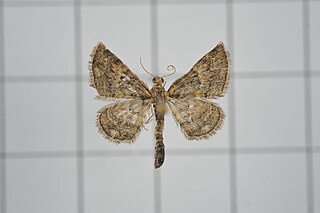Gymnoscelis imparatalis, the flower-looper moth, is a moth in the family Geometridae. It is found from the Indo-Australian tropics of India, Sri Lanka, east to the Society Islands and the Marquesas Archipelago. The habitat consists of both lowland and montane ecosystems.
Gymnoscelis fasciata is a moth in the family Geometridae. It is found in India and on Peninsular Malaysia, Borneo, the Philippines and Sulawesi. The habitat consists of upper montane and dipterocarp forests.
Gymnoscelis exangulata is a moth in the family Geometridae. It is found on Seram, New Guinea and the Solomon Islands.
Gymnoscelis prouti is a moth in the family Geometridae. It is found on Borneo, Sumatra, Peninsular Malaysia and the north-eastern Himalayas. The habitat consists of upper montane areas.
Gymnoscelis erymna is a moth in the family Geometridae. It was described by Edward Meyrick in 1886. It is found on Tonga and Fiji, as well as in Australia.
Gymnoscelis tibialis is a moth in the family Geometridae. It was described by Frederic Moore in 1887. It is found in Sri Lanka and on Java.
Gymnoscelis sara is a moth in the family Geometridae. It is found on Fiji, New Caledonia and Vanuatu.
Gymnoscelis derogata is a moth in the family Geometridae. It is found on Borneo, Peninsular Malaysia, the north-eastern Himalayas, Sulawesi, New Guinea and in Queensland.
Gymnoscelis lophopus is a moth in the family Geometridae. It was described Turner in 1904. It is found in Queensland, Australia.
Gymnoscelis mesophoena is a moth in the Geometridae. It was described by Alfred Jefferis Turner in 1907. It is found in Australia (Queensland) and on the St Matthias Islands of Papua New Guinea.
Gymnoscelis latipennis is a moth in the family Geometridae. It is found on Peninsular Malaysia and Borneo. The habitat consists of alluvial forest and lower montane forests.

Gymnoscelis albicaudata is a moth in the family Geometridae. It is found in the north-eastern Himalayas and on Peninsular Malaysia, Java, Bali, Borneo, the Philippines, Taiwan and Japan. The habitat consists of upper montane forests.
Gymnoscelis merochyta is a moth in the family Geometridae. It is found on Peninsular Malaysia and Borneo.
Gymnoscelis phoenicopus is a moth in the family Geometridae. It was described by Prout in 1958. It is found on Seram, Sulawesi and Borneo. The habitat consists of lower montane forests.
Gymnoscelis smithersi is a 10 millimetres (0.39 in) moth in the family Geometridae. It is found on Norfolk Island.
Gymnoscelis transapicalis is a moth in the family Geometridae. It is endemic to Borneo.

Gymnoscelis tristrigosa is a moth in the family Geometridae. It was described by Arthur Gardiner Butler in 1880. It is found from Sri Lanka and Taiwan to Fiji, Tonga and New Caledonia.
Gymnoscelis semialbida is a moth in the family Geometridae. It is found on Borneo.
Gymnoscelis confusata is a moth in the family Geometridae. It is found on Borneo and Peninsular Malaysia and in Singapore and possibly India.
Gymnoscelis fragilis is a moth in the family Geometridae. It is found on New Guinea.

